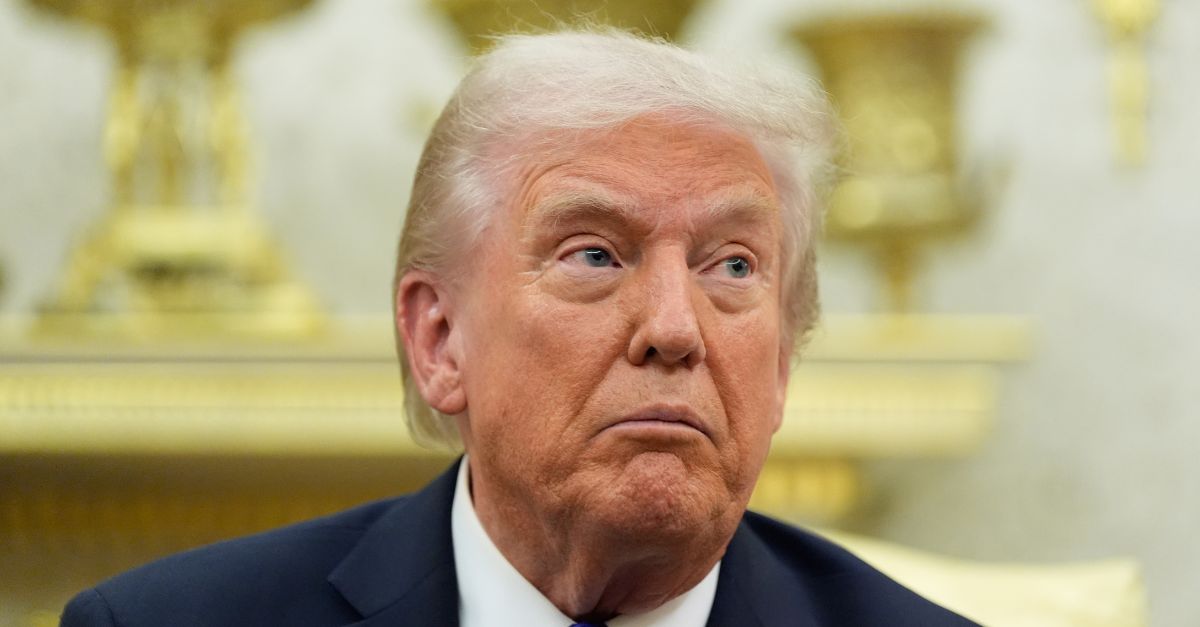
President Donald Trump listens to a question from a reporter as he meets with NATO Secretary General Mark Rutte in the Oval Office of the White House, Wednesday, Oct. 22, 2025, in Washington (AP Photo/Alex Brandon).
President Donald Trump does not have "the unlimited power to set tariffs on all goods imported from all our trading partners," more than 30 former federal judges told the U.S. Supreme Court on Friday.
In their 21-page amicus brief, the amici identify themselves as "31 former federal judges appointed by presidents of both major political parties." The onetime jurists say they "retain a continuing and abiding interest in preserving the independent role of the federal judiciary."
That role, the brief warns, is threatened by the Trump administration's position in the high-stakes tariffs case currently before the high court.
"They seek to ensure that the separation of powers is respected and that any delegation of legislative power to the President is subject to meaningful judicial review," the missive intones.
Love true crime? Sign up for our newsletter, The Law&Crime Docket, to get the latest real-life crime stories delivered right to your inbox.
The underlying litigation is a consolidated collection of cases brought by various kinds of interests opposed to Trump's tariffs regime.
In mid-April, V.O.S. Selections, an alcohol importer, along with other businesses, filed a lawsuit against the tariffs regime – alleging general tumult with pricing, shipping, product selection, inventory levels, reduction in cash flow, and reduction in purchase orders. In late April, a coalition of 12 Democratic Party-led states filed a separate and similar challenge to Trump's tariffs. The cases were later combined.
In late May, the consolidated plaintiffs won the argument – securing a formal kibosh on the tariffs by a unanimous three-judge panel on the Court of International Trade. But in real terms, that ruling was immediately stayed by a 10-judge panel on the appellate court. Then, in August, the U.S. Court of Appeals for the Federal Circuit ruled against the tariffs again – and also stayed its own ruling until Oct. 14 to give the government time to appeal to the Supreme Court.
In early September, the Trump administration filed their petition for a writ of certiorari, warning an end to Trump's claimed tariffs powers would place America on the "brink" of economic "catastrophe."
The major question before the court is whether or not the president has the power to unilaterally impose tariffs under the International Emergency Economic Powers Act (IEEPA).
Each court to review the question has answered in the negative.
The ex-judges, in their amicus brief, phrased the matter slightly differently. First, they say, the IEEPA question is more a matter of whether Congress has ceded such broad authority to the president. And, second, whether the legality of the president's actions is beyond the scope of judicial review.
As for the IEEPA issue, the amici say the federal government is arguing "to uphold the transfer of total authority to set tariffs to the President."
"[F]or a delegation to pass constitutional muster, Congress must 'lay down by legislative act an intelligible principle to which the person or body to fix such rates is directed to conform,'" the amicus brief argues. "Here by contrast, the IEEPA provides no standards to guide the president in determining the countries on which tariffs should be imposed, the goods that should be subject to a tariff, or the rate of such tariffs."
Prior delegations of such powers allowed by the law have involved specific and prescriptive details – surpassing even guidelines as to their specificity – and "an intelligible principle" with which the president must "conform," the judges say. But, they insist, nothing like that is happening here.
"According to President Trump, he can do whatever he wants when it comes to tariffs, imposing them (as he has) even on countries that do not contribute to America's drug-trafficking problem and have no negative balance of payments with the United States," the brief goes on. "We respectfully submit that this is not the law. Under our Constitution, and its careful allocation and separation of powers, Congress cannot hand its tariff-setting authority over to the President lock, stock, and barrel, allowing him to aim it whenever, wherever, and however he pleases."
On the second issue – of judicial review over tariff-setting – the onetime judges portend an even more dire state of affairs, warning of unmitigated power metastasizing indefinitely into amalgam both familiar and abhorrent to U.S. history, politics, and law.
From the amicus brief, at length:
[T]his Court should reject the Solicitor General's argument that courts lack the power to decide whether there were, in fact, "unusual and extraordinary" threats that justified the President's use of the powers assertedly conferred by IEEPA. Giving the President the unreviewable authority to decide whether he may exercise emergency powers would be antithetical to the balance of powers that our founders established as the bedrock of the Constitution…it is the province of the judicial branch to determine whether the President has gone beyond what the law allows.
"For this court to rule that the president alone can exercise unlimited legislative powers without judicial review of a determination that a national emergency exists would give the president tyrannical powers," the brief continues. "Alexander Hamilton observed in The Federalist No. 47: 'The accumulation of all powers, legislative, executive and judiciary, in the same hands, . . . may justly be pronounced the very definition of tyranny.'"
Comments